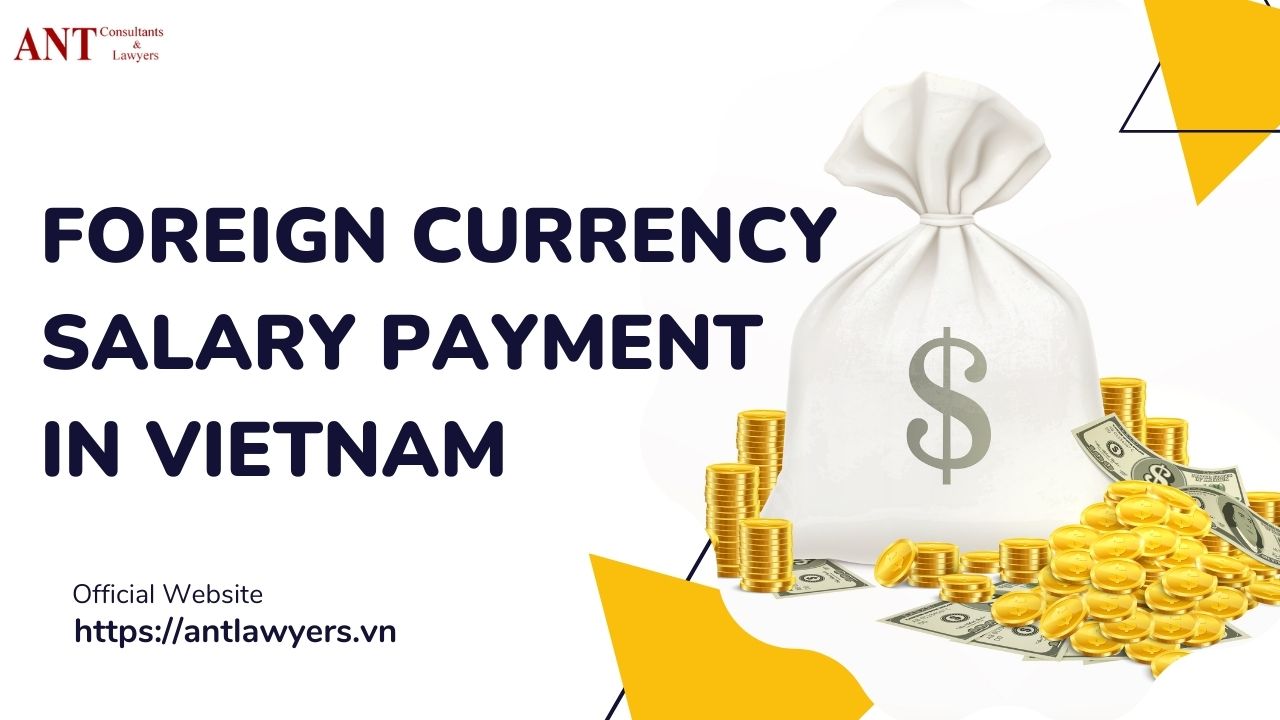7 Crucial Facts About Foreign Currency Salary Payment in Vietnam You Must Know


In the dynamic business environment of Vietnam, compliance with labor and foreign exchange regulations is essential for both local and international companies.
One of the most frequently asked questions by employers and employees is, “Can a salary be paid in a foreign currency?”
In Vietnam, the law is clear: salaries must generally be paid in Vietnamese Dong (VND). However, there are exceptions, especially for foreign workers.
Understanding these exceptions is crucial for avoiding legal issues and ensuring smooth operations.
In the following, we will explore the idea and address concerns about foreign currency salary payment in Vietnam.
Legal Framework Governing Salary Payments
The primary legal instrument that governs salary payments in Vietnam is the regulations on foreign exchange, along with guidance from the State Bank of Vietnam (SBV).
According to the law, all transactions within Vietnam’s territory, including salaries, must be conducted in Vietnamese Dong (VND).
This regulation ensures the stability of the local currency and compliance with the country’s monetary policy.
However, exceptions exist, especially when dealing with foreign workers. Employers should familiarize themselves with these rules to determine when a foreign currency salary payment in Vietnam might be permissible.
Can Foreign Workers Be Paid in Foreign Currency?
Yes, foreign workers can receive their salaries in foreign currencies under certain conditions. This exception applies if the employment contract specifically stipulates foreign currency payments, with the necessary permissions obtained from the authorities.
The foreign currency salary payment in Vietnam must comply with the regulations on foreign exchange management, which means employers must understand the legal requirements and seek appropriate guidance before proceeding.
Conditions for Foreign Currency Salary Payment in Vietnam
To legally process a foreign currency salary payment in Vietnam, employers must adhere to several conditions. These include:
- The foreign worker’s employment contract must explicitly mention the agreement to pay in a foreign currency.
- The payment must comply with foreign exchange regulations, ensuring it does not violate Vietnamese laws on capital controls and anti-money laundering.
Failure to meet these conditions can result in legal penalties, making it crucial for employers to handle this aspect with care.
Advantages of Foreign Currency Salary Payment in Vietnam
There are certain benefits associated with paying salaries in foreign currency, especially for expatriates. These include:
- Ease of Financial Management: Foreign workers often have financial commitments abroad i.e. transfer money from Vietnam abroad so receiving their salaries in a foreign currency can simplify transactions.
- Exchange Rate Stability: Foreign currency payments can protect employees from fluctuations in exchange rates, which can impact their income when converting VND to other currencies.
- Attraction of Foreign Talent: Being able to offer foreign currency salary payments can make a company more attractive to foreign professionals, helping in recruitment efforts.
While these advantages exist, companies must weigh them against the legal requirements and complexities of managing foreign currency transactions in Vietnam.
Steps to Legalize Foreign Currency Salary Payment in Vietnam
If your organization decides to pay salaries in foreign currency, there are specific steps you need to follow:
- Draft Employment Contracts Carefully: Ensure that the contract specifies the currency in which the salary will be paid. This is a legal requirement and will be crucial if you need to obtain approval.
- Ensure Compliance with Foreign Exchange Regulations: Payments must be routed through approved banking channels, ensuring they comply with anti-money laundering laws and other regulatory requirements.
Adhering to these steps will help companies manage the process of foreign currency salary payment in Vietnam legally and efficiently.
Common Challenges in Foreign Currency Salary Payment in Vietnam
Although legal, processing a foreign currency salary payment in Vietnam can come with challenges, including:
- Regulatory Compliance: Employers must navigate complex foreign exchange regulations. This often requires dealing with the State Bank of Vietnam and understanding the nuances of local and international monetary policies.
- Currency Conversion Risks: Employers need to be cautious about exchange rate fluctuations, as this can impact both their payroll costs and the amount received by employees.
- Administrative Burden: Securing approvals and managing foreign currency payments can be time-consuming, requiring additional resources for compliance.
To overcome these challenges, companies are advised to work closely with legal and financial professionals experienced in labor and foreign exchange laws in Vietnam.
Case Study in Foreign Currency Salary Payment in Vietnam
Consider the case of an international IT firm operating in Vietnam. The company employed several foreign experts, all of whom were accustomed to being paid in USD.
The firm’s management decided to offer foreign currency salary payments to attract and retain top talent. After consulting with local legal advisors, they structured employment contracts that included a clause for foreign currency payments.
With all legal aspects in place, the company managed to process payroll without any legal issues, demonstrating how proper planning can make foreign currency salary payment in Vietnam feasible and compliant.
In Vietnam, while the general rule mandates that salaries be paid in Vietnamese Dong (VND), there are exceptions, particularly for foreign workers.
However, employers must navigate a complex web of legal requirements, foreign exchange regulations, and compliance measures to offer foreign currency salary payments. Companies must ensure that employment contracts are drafted correctly, seek necessary permissions, and adhere to legal guidelines to avoid complications.
If your organization is considering foreign currency salary payment in Vietnam, it is essential to work with professionals who understand the local labor and foreign exchange laws.
This will ensure compliance, minimize risks, and help attract top international talent.
Frequently Asked Questions (FAQs)
- Can salaries in Vietnam be paid in USD or other foreign currencies?
- Generally, salaries must be paid in VND, but foreign workers may receive foreign currency payments if the employment contract specifies this and necessary approvals are obtained.
- What legal framework governs foreign currency salary payment in Vietnam?
- The regulations on foreign exchange and related regulations issued by the State Bank of Vietnam outline the rules on salary payments in foreign currency.
- What are the benefits of foreign currency salary payments in Vietnam?
- Advantages include ease of financial management for foreign workers, protection from exchange rate fluctuations, and the ability to attract and retain international talent.
- What are the risks associated with foreign currency salary payment in Vietnam?
- Companies must navigate complex regulations, deal with exchange rate risks, and handle a higher administrative burden.
- What is the process for obtaining approval for foreign currency salary payments?
- Employers must draft employment contracts with specific currency clauses and seek approval from the State Bank of Vietnam, ensuring compliance with foreign exchange regulations.
In summary, while foreign currency salary payment in Vietnam is possible under specific conditions, it requires careful planning, adherence to legal requirements, and consultation with legal experts to ensure compliance and avoid penalties.
About ANT Lawyers, a Law Firm in Vietnam
We help clients overcome cultural barriers and achieve their strategic and financial outcomes, while ensuring the best interest rate protection, risk mitigation and regulatory compliance. ANT lawyers has lawyers in Ho Chi Minh city, Hanoi, and Danang, and will help customers in doing business in Vietnam.
How ANT Lawyers Could Help Your Business?
You could reach ANT Lawyers in Vietnam for advice via email ant@antlawyers.vn or call our office at (+84) 24 730 86 529
Recent Posts
5 Powerful Reasons Why Vietnam Digital Asset Sandbox Is a Bold and Hopeful Move for Innovation
Change is fast. Rules are slow. But innovation can’t wait. As digital assets grow, so…
4 Critical Steps to Effectively Terminate The Employment Contracts with Confidence and Compassion
To terminate the employment contracts can be a complex and often sensitive process, especially when…
8 Insights from a Due Diligence Attorneys in Vietnam for Successful M&A Deals
Navigating the complex landscape of mergers and acquisitions (M&A) in Vietnam can be a daunting…
What 7 Crucial Truths About Arbitration in Vietnam Every Foreign Company Must Know Today?
Let's face the fact, as business owners or directors, would you normally look at dispute…
7 Crucial Legal Challenges Fintech Law Firms in Vietnam Can Help You Overcome for Business Success
Vietnam’s fintech sector is experiencing rapid growth, catching up with the trend of digital financial…
7 Reasons to Set Up a Subsidiary in Vietnam Now: A Powerful and Timely Move Amid Global Shifts
Introduction: The World Is Changing Fast, So Should Your Strategy When the world becomes unpredictable,…






